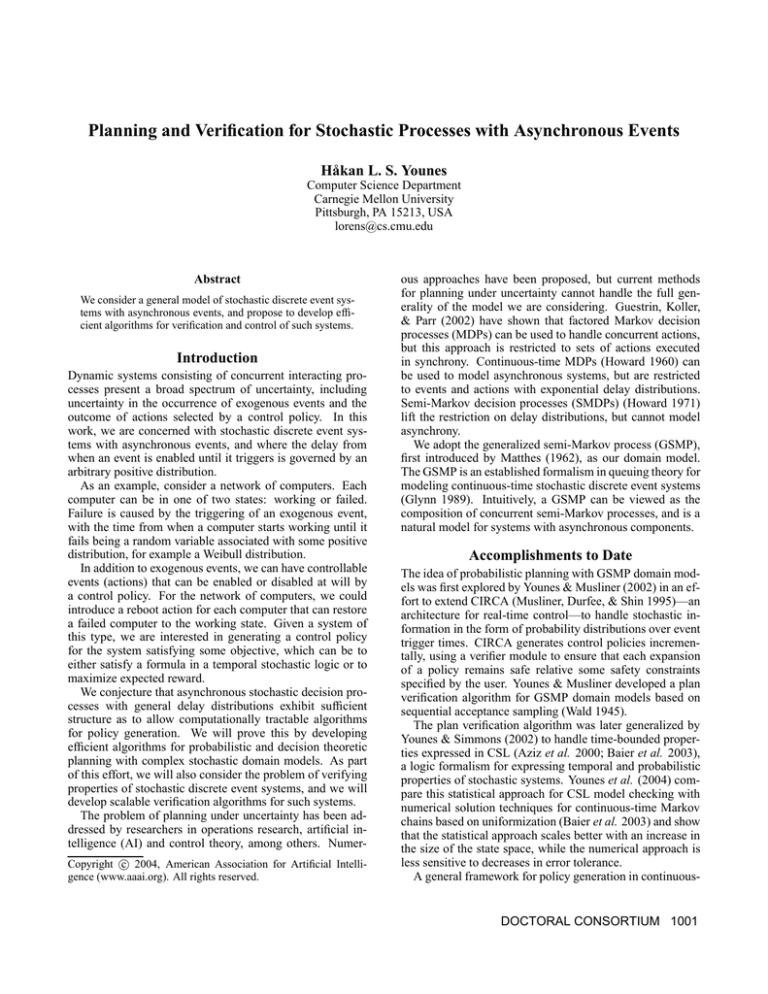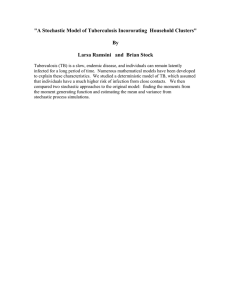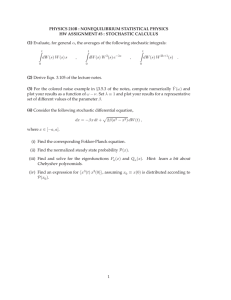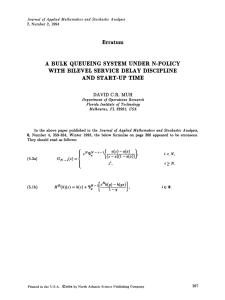
Planning and Verification for Stochastic Processes with Asynchronous Events
Håkan L. S. Younes
Computer Science Department
Carnegie Mellon University
Pittsburgh, PA 15213, USA
lorens@cs.cmu.edu
Abstract
We consider a general model of stochastic discrete event systems with asynchronous events, and propose to develop efficient algorithms for verification and control of such systems.
Introduction
Dynamic systems consisting of concurrent interacting processes present a broad spectrum of uncertainty, including
uncertainty in the occurrence of exogenous events and the
outcome of actions selected by a control policy. In this
work, we are concerned with stochastic discrete event systems with asynchronous events, and where the delay from
when an event is enabled until it triggers is governed by an
arbitrary positive distribution.
As an example, consider a network of computers. Each
computer can be in one of two states: working or failed.
Failure is caused by the triggering of an exogenous event,
with the time from when a computer starts working until it
fails being a random variable associated with some positive
distribution, for example a Weibull distribution.
In addition to exogenous events, we can have controllable
events (actions) that can be enabled or disabled at will by
a control policy. For the network of computers, we could
introduce a reboot action for each computer that can restore
a failed computer to the working state. Given a system of
this type, we are interested in generating a control policy
for the system satisfying some objective, which can be to
either satisfy a formula in a temporal stochastic logic or to
maximize expected reward.
We conjecture that asynchronous stochastic decision processes with general delay distributions exhibit sufficient
structure as to allow computationally tractable algorithms
for policy generation. We will prove this by developing
efficient algorithms for probabilistic and decision theoretic
planning with complex stochastic domain models. As part
of this effort, we will also consider the problem of verifying
properties of stochastic discrete event systems, and we will
develop scalable verification algorithms for such systems.
The problem of planning under uncertainty has been addressed by researchers in operations research, artificial intelligence (AI) and control theory, among others. Numerc 2004, American Association for Artificial IntelliCopyright gence (www.aaai.org). All rights reserved.
ous approaches have been proposed, but current methods
for planning under uncertainty cannot handle the full generality of the model we are considering. Guestrin, Koller,
& Parr (2002) have shown that factored Markov decision
processes (MDPs) can be used to handle concurrent actions,
but this approach is restricted to sets of actions executed
in synchrony. Continuous-time MDPs (Howard 1960) can
be used to model asynchronous systems, but are restricted
to events and actions with exponential delay distributions.
Semi-Markov decision processes (SMDPs) (Howard 1971)
lift the restriction on delay distributions, but cannot model
asynchrony.
We adopt the generalized semi-Markov process (GSMP),
first introduced by Matthes (1962), as our domain model.
The GSMP is an established formalism in queuing theory for
modeling continuous-time stochastic discrete event systems
(Glynn 1989). Intuitively, a GSMP can be viewed as the
composition of concurrent semi-Markov processes, and is a
natural model for systems with asynchronous components.
Accomplishments to Date
The idea of probabilistic planning with GSMP domain models was first explored by Younes & Musliner (2002) in an effort to extend CIRCA (Musliner, Durfee, & Shin 1995)—an
architecture for real-time control—to handle stochastic information in the form of probability distributions over event
trigger times. CIRCA generates control policies incrementally, using a verifier module to ensure that each expansion
of a policy remains safe relative some safety constraints
specified by the user. Younes & Musliner developed a plan
verification algorithm for GSMP domain models based on
sequential acceptance sampling (Wald 1945).
The plan verification algorithm was later generalized by
Younes & Simmons (2002) to handle time-bounded properties expressed in CSL (Aziz et al. 2000; Baier et al. 2003),
a logic formalism for expressing temporal and probabilistic
properties of stochastic systems. Younes et al. (2004) compare this statistical approach for CSL model checking with
numerical solution techniques for continuous-time Markov
chains based on uniformization (Baier et al. 2003) and show
that the statistical approach scales better with an increase in
the size of the state space, while the numerical approach is
less sensitive to decreases in error tolerance.
A general framework for policy generation in continuous-
DOCTORAL CONSORTIUM 1001
time stochastic domains with asynchronous events and actions was presented by Younes, Musliner, & Simmons
(2003) based on the Generate, Test and Debug paradigm
(Simmons 1988). The test step is carried out using the statistical verification algorithm mentioned above making it possible to plan for arbitrary time-bounded CSL goals. Concrete techniques for representing and generating initial policies using an existing deterministic temporal planner, robust sample path analysis techniques for extracting failure
scenarios, and efficient policy repair techniques were presented in a followup paper (Younes & Simmons 2004a).
These techniques have been implemented in T EMPASTIC, a
novel planner accepting domain descriptions in an extension
of PDDL developed by Younes (2003) and using VHPOP
(Younes & Simmons 2003) as a deterministic planner.
Remaining Research Effort
While T EMPASTIC represents a step towards practical planning algorithms for complex stochastic domains with asynchronous events, there is still work to be done to improve
its efficiency. We need to develop heuristics for selecting
failure scenarios that best will guide the search towards a
policy satisfying a given CSL goal. We are also exploring
ways to improve the efficiency of the verification algorithm,
including distributed algorithms.
In addition to research on probabilistic planning, we are
pursuing decision theoretic approaches as well. For this
purpose, we will introduce the generalized semi-Markov
decision process (GSMDP) as a model for decision theoretic planning with asynchronous events and actions. We
need to develop practical policy generation algorithms for
GSMDPs, and are currently exploring various possible directions for this research. In a recent paper (Younes &
Simmons 2004b) we propose using phase-type distributions
(Neuts 1981) to approximate general distributions in the
GSMDP model, which enables us to use standard MDP techniques to approximately solve GSMDPs. We also expect
Monte Carlo integration and value function approximation
using nearest neighbor learning, previously used for solving
partially observable MDPs (Thrun 2000), to be useful for
solving GSMDPs.
References
Aziz, A.; Sanwal, K.; Singhal, V.; and Brayton, R. 2000.
Model-checking continuous-time Markov chains. ACM
Transactions on Computational Logic 1(1):162–170.
Baier, C.; Haverkort, B. R.; Hermanns, H.; and Katoen, J.P. 2003. Model-checking algorithms for continuous-time
Markov chains. IEEE Transactions on Software Engineering 29(6):524–541.
Glynn, P. W. 1989. A GSMP formalism for discrete event
systems. Proceedings of the IEEE 77(1):14–23.
Guestrin, C.; Koller, D.; and Parr, R. 2002. Multiagent
planning with factored MDPs. In Advances in Neural Information Processing Systems 14: Proc. 2001 Conference.
Cambridge, MA: The MIT Press. 1523–1530.
Howard, R. A. 1960. Dynamic Programming and Markov
Processes. New York, NY: John Wiley & Sons.
1002
DOCTORAL CONSORTIUM
Howard, R. A. 1971. Dynamic Probabilistic Systems, volume II. New York, NY: John Wiley & Sons.
Matthes, K. 1962. Zur Theorie der Bedienungsprozesse.
In Trans. Third Prague Conference on Information Theory,
Statistical Decision Functions, Random Processes, 513–
528. Publishing House of the Czechoslovak Academy of
Sciences.
Musliner, D. J.; Durfee, E. H.; and Shin, K. G. 1995. World
modeling for the dynamic construction of real-time control
plans. Artificial Intelligence 74(1):83–127.
Neuts, M. F. 1981. Matrix-Geometric Solutions in Stochastic Models: An Algorithmic Approach. Baltimore, MD:
Johns Hopkins University Press.
Simmons, R. G. 1988. A theory of debugging plans and
interpretations. In Proc. Seventh National Conference on
Artificial Intelligence, 94–99. AAAI Press.
Thrun, S. 2000. Monte Carlo POMDPs. In Advances
in Neural Information Processing Systems 12: Proc. 1999
Conference. Cambridge, MA: The MIT Press. 1064–1070.
Wald, A. 1945. Sequential tests of statistical hypotheses.
Annals of Mathematical Statistics 16(2):117–186.
Younes, H. L. S., and Musliner, D. J. 2002. Probabilistic
plan verification through acceptance sampling. In Proc.
AIPS-02 Workshop on Planning via Model Checking, 81–
88.
Younes, H. L. S., and Simmons, R. G. 2002. Probabilistic verification of discrete event systems using acceptance
sampling. In Proc. 14th International Conference on Computer Aided Verification, volume 2404 of LNCS, 223–235.
Springer.
Younes, H. L. S., and Simmons, R. G. 2003. VHPOP: Versatile heuristic partial order planner. Journal of Artificial
Intelligence Research 20:405–430.
Younes, H. L. S., and Simmons, R. G. 2004a. Policy generation for continuous-time stochastic domains with concurrency. In Proc. Fourteenth International Conference on
Automated Planning and Scheduling. AAAI Press.
Younes, H. L. S., and Simmons, R. G. 2004b. Solving
generalized semi-markov decision processes using continuous phase-type distributions. In Proc. Nineteenth National Conference on Artificial Intelligence. AAAI Press.
Younes, H. L. S.; Kwiatkowska, M.; Norman, G.; and
Parker, D. 2004. Numerical vs. statistical probabilistic
model checking: An empirical study. In Proc. 10th International Conference on Tools and Algorithms for the Construction and Analysis of Systems, volume 2988 of LNCS,
46–60. Springer.
Younes, H. L. S.; Musliner, D. J.; and Simmons, R. G.
2003. A framework for planning in continuous-time
stochastic domains. In Proc. Thirteenth International Conference on Automated Planning and Scheduling, 195–204.
AAAI Press.
Younes, H. L. S. 2003. Extending PDDL to model stochastic decision processes. In Proc. ICAPS-03 Workshop on
PDDL, 95–103.





